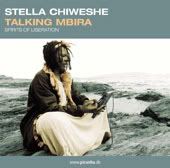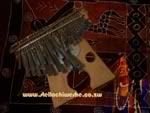 Stella Rambisai Chiweshe was born in Mujumi Village in Mhondoro, Zimbabwe in 1946 and is the great grand daughter of Munaka, a resistance fighter who was eventually hung by the British. She is an internationally known musician, well respected for her singing and playing of the mbira dzavadzimu (or mbira 'of the ancestors').
Stella Rambisai Chiweshe was born in Mujumi Village in Mhondoro, Zimbabwe in 1946 and is the great grand daughter of Munaka, a resistance fighter who was eventually hung by the British. She is an internationally known musician, well respected for her singing and playing of the mbira dzavadzimu (or mbira 'of the ancestors').Stella learned to play the mbira between 1966 and 1969 at a time when females who played the mbira was practically unheard of. When she announced her decision to play the mbira, an instrument played exclusively by males, she met with as much resistance from the women as the men. In fact, due to the fact that she was often in the presence of men in order to learn how to play the mbira, the women in her village would look down upon her as being a promiscuous woman. Despite these obstacles, Stella Chiweshe persevered in her unwavering determination to follow her dreams and in doing so, opened the doors for many female musicians in Zimbabwe.
The mbira dzavadzimu is a traditional instrument of the Shona peoples of Zimbabwe that has been used for thousands of years going back to back to time of Chaminuka, who were the Mhondoro or Great Spirit Mediums. There are variations of the mbira in parts of South, Central, West and East Africa as well as Caribbean countries like Cuba, Puerto Rico and Haiti. The mbira is by known other names in other parts of Africa and the Caribbean, for example Kalimba, Mbila, Likembe, and Marimbola. The traditional mbira has 22 iron keys, but can have anywhere from 22-28 keys. Stella refers to her mbira's 23 keys as 23 voices. The keys are mounted on a hardwood soundboard and placed inside a gourd which acts as a resonator. Sometimes shells or other objects are placed on the soundboard of the mbira to create a buzzing noise that's said to attract the ancestor spirits.
 The mbira has a very comforting sound, and at times can be reminiscent of running water. It is considered a sacred instrument and traditionally has been played at religious ceremonies (bira) and at social events (mapira) as well as within the royal Shona Courts. It is often used to communicate with ancestor spirits as well as for healing, guidance and success in battle. In the 'bira' ceremonies, the mbira is combined with the hosho (gourd rattles), singing and sometimes with the ngona (drum). Before the independence of Zimbabwe, Stella would attend these 'secret' ceremonies at night in colonial Zimbabwe (Rhodesia) and go to work as a maid during the day.
The mbira has a very comforting sound, and at times can be reminiscent of running water. It is considered a sacred instrument and traditionally has been played at religious ceremonies (bira) and at social events (mapira) as well as within the royal Shona Courts. It is often used to communicate with ancestor spirits as well as for healing, guidance and success in battle. In the 'bira' ceremonies, the mbira is combined with the hosho (gourd rattles), singing and sometimes with the ngona (drum). Before the independence of Zimbabwe, Stella would attend these 'secret' ceremonies at night in colonial Zimbabwe (Rhodesia) and go to work as a maid during the day.In the liner notes to "Talking Mbira", Chiweshe recalls incidences where individuals who experienced the sound of the mbira would suddenly lose pain that had afflicted them for years. The comforting sound of the mbira gives it a comforting sound, and the liner notes describe audience members have been moved to tears at hearing its rich, melodic tones, but felt as if the their tears were coming from another source within. "People do not truly understand the strength of this power. It can take you completely by surprise." Stella believes in the spiritual power of the mbira and its ability to help one overcome the daily aches and worries of everyday life, after having witnessed its spiritual potency at traditional ceremonies in Zimbabwe.
She recorded her first single named "Kasahwa" in 1974 with a borrowed mbira, and the song was a popular success. This was followed by a string of successful singles over the next 6 years that established her reputation on the international stage. She joined the National Dance Company in 1981 and began to travel to other countries to perform. Stella Chiweshe directs the Mother Earth Trust - Network of Female Artists in Zimbabwe and had an active role in the formation of the Zimbabwe Musicians Union.
In 1989 she acted in the Godwin Mawuru film "I Am the Future", which was about a young woman fleeing to the big city in order to escape Zimbabwe's independence war in the rural areas. Stella has performed in Germany on several occasions and was also a participant in the WOMAD festival (1994 in the United States and 1995 in Australia). Stella performs as a solo artist and with the Stella Chiseshe Mbira Trio and the Earthquake Band. In 2004 she toured England with her daughter, Virginia Mukwesha who has also established a career playing the mbira. You can listen to Stella Rambisai Chiweshe at Kemet Music Radio. Thank you for tuning in.
Discography:
Album: Double Check
Label: Piranha
Year: 2006
Album: Talking Mbira
Label: Piranha
Year: 2002
Album: The Healing Tree
Label: Shanachie
Year: 1998
Album: Ndizvozvo
Label: ??
Year: 1996
Album: Shungu
Label: Piranha
Year: 1994
Album: Kumusha
Label: Pirahna
Year: 1991
Album: Chisi
Label: (Shanachie 1990 / Piranha 1994)
Year: 1990
Album: Ambuya?
Label: (Globestyle 1987 / Piranha 1988)
Year: 1987
